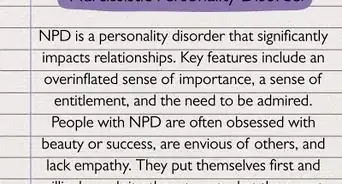This article was co-authored by Jay Reid, LPCC and by wikiHow staff writer, Hannah Madden. Jay Reid is a Licensed Professional Clinical Counselor (LPCC) in private practice in San Francisco, CA. He specializes in helping clients who have survived a narcissistic parent or partner. Treatment focuses upon helping clients identify and challenge self-diminishing beliefs as a result of narcissistic abuse. Jay holds a BA in Psychology from the University of Pennsylvania and an MS in Clinical Psychology from Penn State University.
This article has been viewed 16,360 times.
Communicating with someone who has narcissistic personality disorder can be tough, especially if they’re trying to start an argument. Shutting them down is the best way to avoid an explosive conversation—but how, exactly, can you do that? In this article, we’ll give you a comprehensive list of things to say so you can neutralize the situation right away and avoid a fight.
Steps
“I understand why you feel that way.”
-
Empathetic language can help a narcissist feel understood. Narcissists often think that no one else can understand what they’re going through. By telling a person with narcissistic personality disorder that you see where they’re coming from, you’re telling them that they’re not all alone in this world. Try this if you think their feelings are justified, even if they are being a little dramatic.[1] X Research source
- “I’d probably react the same way if I was in your position.”
- “I get why you’re upset.”
“You may be right.”
-
A neutral statement can disarm someone who’s emotional. When you’re talking with a narcissist, it’s best to avoid making any statements for or against what they’re saying. Instead, say something non-committal that’s just enough to appease them. Hopefully, your lack of a reaction will be enough to get them to move on.[2] X Research source
- “That’s an interesting point.”
- “Hm, I never thought about it like that.”
“I think we got off track somehow.”
-
Using “we” language shifts the blame to both of you. If there’s one thing narcissists can’t stand, it’s being blamed for something (even if it’s totally justified). By lumping yourself in with their behavior, they’re much more likely to be open to discussing things calmly.[3] X Research source
- “We might be misunderstanding each other.”
- “I think there’s been a miscommunication. Can we try again?”
“Let’s discuss this later.”
-
Push off the discussion, but don’t make the narcissist feel cast aside. If they’re trying to rile you up in public or when you’re already stressed out, tell them you don’t want to talk right now. However, make sure you promise to circle back around to it later—that way, they know you’re taking their concerns seriously.[4] X Research source
- “I don’t feel comfortable talking about this right now.”
- “Let’s not have this discussion in front of everyone.”
“Does that seem reasonable to you?”
-
Appeal to a narcissist’s sense of logic to get them to stand down. Sometimes, a clarifying question can get them to snap out of their sense of entitlement. If they’re asking you to do something that really isn’t a reasonable request, a direct question might just shut them down.[5] X Research source
- “Does your request sound fair to you?”
- “Would you do the same thing for me?”
“Are you asking me or telling me?”
-
Make it clear that you don’t like to be bossed around. If a narcissist is demanding something of you, remind them with a gentle question that their behavior isn’t polite. Sometimes, people with narcissistic personality disorder get so wrapped up in their own thoughts that they forget what’s socially acceptable and what isn’t.[6] X Research source
- “Please don’t order me around like that.”
- “Could you rephrase that, please?”
“Do I have any say in this?”
-
Remind the person you’re talking to that you have needs, too. A lot of times, people with narcissistic personality disorder forget that there are other people with needs and wants around them.[7] X Expert Source

Licensed Professional Clinical Counselor Expert Interview. 7 August 2020. Let them know that you’d like to have some input by asking them a question about your own needs.[8] X Research source- “Are you thinking about both of us, or just yourself?”
- “Can I make a suggestion?”
“When you criticize me, it makes me feel upset.”
-
Focus on how you feel to lower a narcissist’s defenses. Many people with narcissistic personality disorder don’t handle criticism well. If you can shift the focus to yourself and not them, you may be able to have a more productive discussion.[9] X Trustworthy Source HelpGuide Nonprofit organization dedicated to providing free, evidence-based mental health and wellness resources. Go to source
- “Please don’t yell at me in public. It makes me feel belittled.”
- “I feel hurt that you’d dismiss me like that.”
“You can’t speak to me that way.”
-
Set a firm boundary, and don’t let them cross it. When you’re dealing with a narcissist time and time again, it’s important to set boundaries for yourself. It will keep you from being taken advantage of, and it will make you feel better, too. If you’re being yelled at or called names, tell them that it’s unacceptable.[10] X Research source
- “What makes you think it’s okay to treat me like this?”
- “If you want me to be nice to you, you have to be nice to me, too.”
“If you keep this up, I’m leaving.”
-
Set real, actionable consequences for a narcissist’s bad behavior. Following through on consequences shows that you’re a strong person who won’t stand for their boundaries being pushed. Don’t put up with anything that crosses your boundaries, and feel free to walk away if you’re disrespected.[11] X Research source
- “I won’t listen to you when you yell at me. Let’s talk when you can be respectful.”
- “If you raise your voice at me one more time, I’m ending this relationship.”
“...”
-
Saying nothing can often stop a narcissist in their tracks. Oftentimes, people with narcissistic personality disorder will make inflammatory or rude comments to intentionally rile you up. If you can remain calm and avoid talking to them all together, you might be able to avoid a fight of any kind.[12] X Trustworthy Source HelpGuide Nonprofit organization dedicated to providing free, evidence-based mental health and wellness resources. Go to source
- Staying calm in the face of rude comments can be tough. Try taking deep breaths and counting to 10 before you respond.
You Might Also Like

 11 Ways to Drive a Narcissist Nuts
11 Ways to Drive a Narcissist Nuts


 How to Spot & Deal with a Narcissistic Woman
How to Spot & Deal with a Narcissistic Woman

 Controlling Narcissists: Setting Boundaries & Deescalating Behavior
Controlling Narcissists: Setting Boundaries & Deescalating Behavior







References
- ↑ https://www.psychologytoday.com/us/blog/understanding-narcissism/201710/how-de-escalate-fight-narcissist
- ↑ https://psychcentral.com/blog/the-language-of-narcissists#2
- ↑ https://www.psychologytoday.com/us/blog/understanding-narcissism/201710/how-de-escalate-fight-narcissist
- ↑ https://psychcentral.com/blog/the-language-of-narcissists#2
- ↑ https://www.psychologytoday.com/us/blog/communication-success/201705/how-talk-narcissist-about-being-narcissistic
- ↑ https://www.psychologytoday.com/us/blog/communication-success/201705/how-talk-narcissist-about-being-narcissistic
- ↑ Jay Reid, LPCC. Licensed Professional Clinical Counselor. Expert Interview. 7 August 2020.
- ↑ https://www.psychologytoday.com/us/blog/communication-success/201705/how-talk-narcissist-about-being-narcissistic
- ↑ https://www.helpguide.org/articles/mental-disorders/narcissistic-personality-disorder.htm
- ↑ https://psychcentral.com/blog/liberation/2018/01/11-mandatory-rules-for-dealing-with-a-narcissist#How-to-Deal-with-a-Narcissist
- ↑ https://psychcentral.com/blog/liberation/2018/01/11-mandatory-rules-for-dealing-with-a-narcissist#How-to-Deal-with-a-Narcissist
- ↑ https://www.helpguide.org/articles/mental-disorders/narcissistic-personality-disorder.htm
About This Article
























































